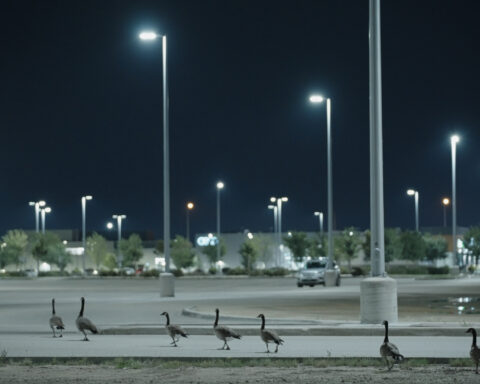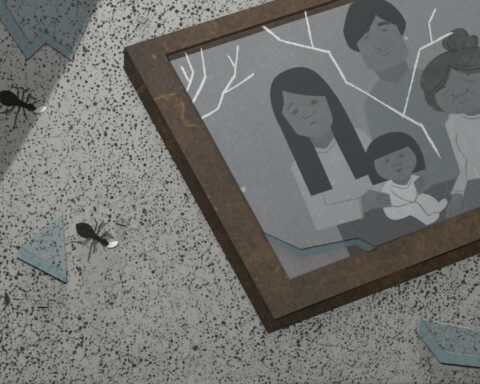The documentary branch of the Academy is responsible for some of the looniest, most incomprehensible, and least defensible snubs in recent years. However, they also deserve credit for their consistent effort to highlight hidden gems over glitzier films with aggressive campaigns. The race for Best Documentary Feature at the Academy Awards is once again a relatively open field after heavy favourite Won’t You Be My Neighbor? was rejected by its peers one year after the doc branch left everyone’s jaws on the floor by snubbing Jane. Both films dominated the fields in their respective years and won virtually all of the key precursors awards that (used to) foreshadow the winners. The doc branch has a quirky aversion towards celebrating their peers who find success, and perhaps they just weren’t willing to give Morgan Neville a second Oscar only five years after 20 Feet from Stardom won or perhaps they felt that Neighbor’s box office haul of over 20 million dollars was an award in itself.
In the absence of Mr. Rogers, the contenders include two of this year’s other box office success stories, RBG and Free Solo, along with three gems that wowed the festival circuit. Here, in alphabetical order, are the five nominees for Best Documentary Feature:
Best Documentary Feature
Free Solo: National Geographic must be relieved. One year after a massively aggressive campaign for Jane came up short, their doc Free Solo has an edge after frontrunner Mr. Rogers got “Janed.” What a breathtaking film Free Solo is. Like Jane, it’s an exhilarating piece of cinema that is impeccably crafted and technically accomplished. Directed by Jimmy Chin and Elizabeth Chai Vasarheyli, the husband and wife team who previously made Meru (and should have earned been nominated for it), Free Solo wows audiences by going intimately close with climber Alex Honnold as he scales the wall of Yosemite Park’s 3000-foot El Capitan cliff without the aid of a rope. Even more amazing than the cinematography is the film’s rich psychology as it puts audiences inside the head of an oddball who is more comfortable in the wild than with his fellow humans—although many viewers find Honnold’s personality alienating. Add a massively aggressive awards campaign by National Geographic that included A-listers like Laura Dern rallying behind it, a People’s Choice Award at TIFF, and a BAFTA win to the mix, and Free Solo might be the film to beat—especially if voters watched it in a theatre and not at home on a DVD screener. – PM
Hale Count This Morning, This Evening The winner of the Jury Prize at the 2018 Sundance Festival and the Grand Prize, International Feature Film, at the Montreal International Documentary Festival, Hale County This Morning, This Evening is a bold and innovative film and certainly one of the finest artistic docs of recent years. The first feature by RaMell Ross, an award-winning photographer and Brown University professor, explores what it’s like to be young, gifted and black in Hale County, Alabama today. Ross was a highly scouted basketball player as a teenager—injuries stopped his athletic career—so it was easy for him to gravitate to two young basketball players, Daniel and Quincy, and follow their lives. Neither player is going to be a star but this film isn’t intended to be another Hoop Dreams. It’s a poetic journey into the world of young African-Americans leading difficult lives in a racist, segregated state. Hale County This Morning, This Evening is a deeply observational film, immersed in the day to day life of the people in an impoverished rural area in the American South. Although some things do happen in the film including one tragic event, the appeal of Hale County is in Ross’ ability to capture the details of life in contemporary Alabama. The people Ross record have the love of their games and families but they are stuck in a no-win situation. – MG
Minding the Gap: Director Bing Liu introduces himself as a born talent behind the camera with a film that comes straight from the heart. Minding the Gap is an outstanding debut feature and Liu has a remarkable ability to let audiences into his life and those of his closest friends in what is a revealing coming of age story. Using a mix of candid interviews and home movies shot on the streets of Chicago while whizzing around on a skateboard, Liu’s years-in-the-making film captures the growing pains of inner city youths with an empowering and revitalizing energy. Although Minding the Gap struck out with the guild nominations—Directors, Producers, Editors—that often predict an Oscar win, it’s arguably the critical favourite of the nominees. Its wins include the doc prize from the National Society of Film Critics, New York Film Critics Circle, and International Documentary Association, as well as numerous film festival awards and critical gongs for best first feature and best film editing. Moreover, Gap is the latest nominee for Kartemquin Films, which has yet to bring home an Oscar despite over 50 years of ground-breaking and socially significant documentaries. Forget Glenn Close—they’re long overdue. This fresh voice from Chicago would be a fitting film to cement their legacy with Oscar gold. – PM
Of Fathers and Sons: The doc branch seems to have a few consistent camps. This year, Of Fathers and Sons occupies what’s become the obligatory “challenging political doc” slot among the feature doc nominees. Last year’s winner for the Grand Jury Prize for Documentary (World Cinema) at Sundance, Of Fathers and Sons is one of the stronger films to tackle war in the Middle East. It’s astonishing provided one has the stomach to sit through it. Talal Derki’s harrowing portrait of young boys learning to be the next generation of soldiers for the Taliban provides one of the most unique perspectives on a complicated political situation. The doc puts a human face to a generation born into war. The film is difficult and emotionally draining, and presumably plays much better with the doc crowd than the wider membership, which may be evidenced in its relatively limited theatrical run and overall absence on the awards circuit. It’s the dark horse of the race. -PM
RBG: Condolences to Black Panther, but Ruth Bader Ginsburg was the best superhero of 2018. With that being said, one could argue that people are voting for Ginsburg rather than for RBG. Her scrappy spirit makes for a great subject and an especially timely one when women’s rights, and civil rights in general, are under siege in the age of Trump. Giving RBG an Oscar might be a means of voicing dissent against Trump, but the doc is already a winner given its boffo box office haul (over $14 million). It’s a huge word of mouth hit with audiences. As a piece of filmmaking, RBG is nothing especially groundbreaking—it’s a conventionally crafted character profile—although few people seem to mind since its modest style lets the subject do the talking and Ginsburg hits all the right notes. The industry stands behind RBG as much as audiences do with the film landing nominations at key guilds, along with a win for top doc from the National Board of Review and Best Political Documentary from the Critics’ Choice Awards. The doc has a second nomination with Diane Warren’s anthemic call to action I’ll Fight, sung by Oscar winner Jennifer Hudson, which might result in some vote splitting if people want to acknowledge the film elsewhere…even though Warren will inevitably lose the music race to Lady Gaga. -PM
Pat Says:
Will win: Free Solo
It’s been dubbed Manspreading: The Movie by some viewers for its boisterous, somewhat arrogant subject, but Free Solo’s character quirks are part of its appeal. It’s also the most awesome and technically accomplished doc of the bunch with nomination-worthy cinematography that takes audiences to dizzying extremes, offering the biggest cinematic thrill of the nominees. Last year’s winner Icarus proved that Oscar voters love a good doc that takes the sports movie to new heights and with its adrenaline-pumping high-wire act, Free Solo is the logical film to beat.
Should win: Minding the Gap
Minding the Gap is exactly the kind of film that deserves to do well by awards bodies. It’s an empowering feat of self-representation that resonates strongly because the filmmaker’s voice is integral to the film. Gap is brave and intimate as it puts onscreen the lives of young people who rarely see their experiences reflected. One feels the impact of the project over the course of the documentary as Liu captures his friends at their highest and lowest. The intimate proximity of the camera between the subjects, and ultimately himself, proves transformative.
Should have been there: Won’t You Be My Neighbor?
Won’t You Be My Neighbor?, for me, was not simply the best documentary of 2018 but the best film of 2018. Besides being such a fun and unexpectedly moving portrait of TV icon Fred Rogers, Morgan Neville’s doc offered a call to action that seemed so simple, yet urgent, as it reminded audiences of the lost art of kindness in an increasingly toxic world. I’m grateful to Neville for making a film that made me pause and reconsider what I value and how I interact with others. Maybe I’m naïve, but Neighbor is one of the few films that I think can change the world.
Marc Says:
Will win: RBG
I suspect that RBG will win, simply because Hollywood liberals love Ruth Bader Ginsburg—and, heck, they’re around her age, too. I love Ms. Ginsburg but the doc is mediocre.
Should win: Hale County This Morning, This Evening
When this perfectly judged essay film about the current life in the rural county in Alabama, where Walker Evans and James Agee photographed and wrote Let Us Now Praise Famous Men, was released, I wrote: “It’s a poetic journey into the world of young African-Americans leading almost impossibly difficult lives in a racist, segregated state.” RaMell Ross’ African-American documentary should win but will it?
Should have been there: Bisbee ’17
I’m not at all surprised that Robert Greene’s extraordinary unearthing of a priceless piece of Americana has gone unnoticed since its unsettling arrival last spring at Sundance. This innovative film depicts the brutal deportation of 1200 radicals, immigrants and discontented union workers by the local citizenry of the town of Bisbee, Arizona, a nearly unchanged locale set between Tombstone and the Mexican border. It was brother vs brother as the Establishment of the era—the mining companies and the banks—conspired to expunge their revolutionary element and leave them in the desert in New Mexico with orders to never return home. Director Greene and friends convinced the city of Bisbee to recreate this problematic event a century later and the film moves from historical anecdotes to the reality of how people behave when one side is told to dominate the other. The film has been rightfully compared to The Act of Killing: it’s a study of how fascism works now and then by giving an inordinate level of power to people who happily exercise authority over dissenting voice individuals. This brilliant film essay was praised by Variety, the New Yorker and the Washington Post (and POV) but it is too artistic and intelligent to attract the votes of the Academy in 2019.
Best Short Docs
The nominees: Black Sheep, End Game, Lifeboat, A Night at the Garden, Period. End of Sentence.
Read a complete breakdown of the Oscar nominated short docs here and watch them here.
Pat Says:
Will win: Period. End of Sentence
It might be the RBG of the short docs given its crowd-pleasing subject matter and plain Jane filmmaking. However, it’s the most accessible and buoyant contender in a dark batch of nominees, and has considerable star power behind it. It also offers one of the night’s few opportunities to champion women in film through the ballot.
Should win: Black Sheep
Black Sheep stands tallest among strong competition. This Guardian short doc directed by Ed Perkins is a punch to the gut with its account by Nigerian-born Brit Cornelius Walker as he reflects on his encounters with virulent racism. Effective dramatic re-enactments offer haunting images of violence and self-loathing, while Walker’s candid interview makes for riveting cinema.
Marc Says:
Should and will win: Period. End of Sentence
It’s year two of #MeToo and I’m expecting that even more awards will go to films this year with a feminist or diversity slant. And I’m all in favour of that. This short, set in a village near Delhi in India, is about women finally being able to take power of accounts of their menstruation, and with the help of California women, learn how to fly over generations of prejudice and make the recognition of women’s bodies understandable. Is it ground-breaking structurally or aesthetically? No, but it does what fine docs can do: make a film that gives the audience a persuasive and emotional case for righting centuries of wrong.












